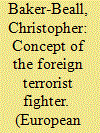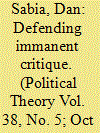| Srl | Item |
| 1 |
ID:
190899


|
|
|
|
|
| Summary/Abstract |
The conflicts in Iraq and Syria have led to concerns in the West over ‘foreign fighters’. Although states are anxious about the role these individuals play in the conflicts they join, their primary concern relates to the perceived ‘terrorist’ threat they pose on their return. This fear has led to an evolution in the international policymaking arena, with foreign fighters now often referred to as ‘foreign terrorist fighters’ (FTFs). A Critical Theory-inspired immanent critique is offered to highlight various problems that exist with the FTF term and to argue policymakers should resist its use. The article demonstrates the importance of language by showing how the invocation of the FTF threat has strengthened the ongoing development of globally coordinated counterterrorism action. Specifically, it argues UN Security Council Resolution 2178, agreed in 2014, generates a legal obligation upon UN member states to implement new counterterrorism laws at national level to combat the perceived threat from FTFs. The article highlights the negative effect these laws have on human rights. It is argued institutions like the UN need to ensure new counterterrorism legal instruments are built from a human rights rather than security-first perspective if commitments to human rights in transnational counterterrorism are to be fully realised.
|
|
|
|
|
|
|
|
|
|
|
|
|
|
|
|
| 2 |
ID:
099573


|
|
|
|
|
| Publication |
2010.
|
| Summary/Abstract |
This article develops, illustrates, and defends a conception of immanent critique. Immanent critique is construed as a form of hermeneutical practice and second-order political and normative criticism. The common charge that immanent critique is a form of philosophical conventionalism necessarily committed to value relativism and to the rejection of transcultural and cosmopolitan norms is denied. But immanent critique insists that meaningful and potentially efficacious criticism must be connected to relevant criteria and understandings internal to the culture or social order at which the criticism is directed. The complaint that this demand will likely limit political and moral criticism is also denied, and the ability of immanent critique to develop from convention unconventional thinking is defended and demonstrated.
|
|
|
|
|
|
|
|
|
|
|
|
|
|
|
|
| 3 |
ID:
114595


|
|
|
|
|
| Publication |
2012.
|
| Summary/Abstract |
The critical security studies literature has been marked by a shared commitment towards the politicization of security - that is, the analysis of its assumptions, implications and the practices through which it is (re)produced. In recent years, however, politicization has been accompanied by a tendency to conceive security as connected with a logic of exclusion, totalization and even violence. This has resulted in an imbalanced politicization that weakens critique. Seeking to tackle this situation, the present article engages with contributions that have advanced emancipatory versions of security. Starting with, but going beyond, the so-called Aberystwyth School of security studies, the argument reconsiders the meaning of security as emancipation by making the case for a systematic engagement with the notions of reality and power. This revised version of security as emancipation strengthens critique by addressing political dimensions that have been underplayed in the critical security literature.
|
|
|
|
|
|
|
|
|
|
|
|
|
|
|
|
| 4 |
ID:
160881


|
|
|
|
|
| Summary/Abstract |
The article examines the roles of NGOs in banning cluster munitions that resulted in the 2008 Convention on Cluster Munitions and the campaign against landmines in the 1990s. It argues that NGOs have managed to move questions about the use of force from the closed decision-making sphere of military commanders and arms control diplomats into open public debate. Thus NGOs have simultaneously desecuritised the use of force by states, securitised certain weapons technologies, and made human beings the referent object of security. This has marked a shift from state security and strategic disarmament to human security and humanitarian disarmament, without fundamentally challenging the laws of war. However, in contrast to realist views that only militarily useless weapons ever get banned and radical critical perspectives that see new legal regimes as legitimating war and US hegemony, I argue that NGOs have engaged in immanent critique of military arguments and practices based on prevailing principles of international humanitarian law. The resulting weapon ban treaties have both restrained US policy and undermined its legitimacy. The article explores the discursive choices that underpinned the remaking of the security agenda by NGOs and their role as de/securitising actors and emancipatory agents of change.
|
|
|
|
|
|
|
|
|
|
|
|
|
|
|
|